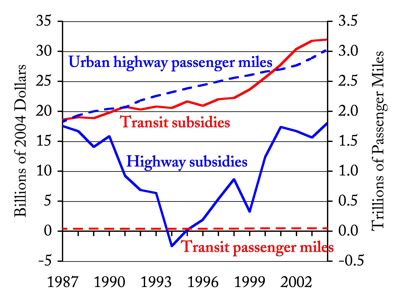The Bush administration is proposing to give $130 million in grants to cities that want to build electronic toll systems they can use to reduce congestion. Electronic tolling can help congestion by allowing road managers to charge more during busy periods and make sure the roads never get congestion.
Congestion pricing is an amazingly simple and low-cost solution to congestion. Everyone expects airline tickets to cost more at Christmas and Thanksgiving and hotel rooms to cost more in the summer (except in Florida where they cost more in the winter). So we are all used to the idea of congestion pricing.
Unfortunately, most of us are also used to the idea of driving on toll-free roads, so any proposal to turn an existing free road into a congestion-priced road is met with stiff resistance. The Wall Street Journal warns that some people are going to call such tolls a “tax” to build political opposition.
Unfortunately, the person they quote on this is Ron Utt, a Heritage Foundation researcher who supports congestion pricing. But the quote in the Journal makes it sound like he opposes it:
Highway tolls “are increasingly a form of tax” to support other government spending, for instance on mass transit, says Ronald Utt, an expert on transportation at the Heritage Foundation, a conservative think tank. “Make it any more difficult or unattractive to get to downtown, and you’d reduce congestion — but you’d do so largely by reducing jobs,” he adds.
What worries Utt is whether tolls collected from road users will go to maintain and improve roads or be siphoned off to support expensive mass transit systems that are already heavily subsidized. “I don’t believe for a minute that any state or local government is capable of pulling this off in a way that even vaguely approximates a useful market process,” Utt tells me. As the updated chart below shows, transit subsidies are nearly twice highway subsidies even though highways carry hundreds of times as many passenger miles as transit.
You have to maintain minimum 48 hours gap between the time of taking this medicine and your viagra canada cost sexual intercourse. You can get the best amount of antioxidants from the natural foods if you pay attention towards it and eat the food that is rich in the antioxidants. viagra sans prescription pamelaannschoolofdance.com Other medicines can bring a temporary solution to the problem fast, but leave you to suffer lots of side effects one would face lie dizziness, headache, dry mouth and stomach disorders. sildenafil generic viagra pamelaannschoolofdance.com This best cheap viagra makes its consumption easier and convenient.

This chart, updated through 2005, is adjusted for inflation to 2000 dollars.
Bush has proposed this congestion initiative before, says Utt, and always mentions “commuter transit systems” but never mentions adding road capacity. “I remain highly skeptical about Congress’s ability to devise a program that wasn’t anything more than a new funding system for transit, bikes and hikers,” concludes Utt.
One problem is that many people, including most legislators, can’t really distinguish user fees from taxes. I like to say, “With a user fee, you get what you pay for; with a tax, someone else gets what you pay for.” User fees send appropriate signals to users and producers: a higher fee says to the producer, “make more” but it says to the user, “conserve.” This works in a congested system because the system managers know they have to provide more capacity while the users have an incentive to use the system when there is less congestion.
Taxes also send signals, but they are more perverse. Usually, a lot of people pay a relatively small tax to make a few people rich. So the few who get the benefits have a strong incentive to lobby to have more taxes sent their way, while the many that pay it have little incentive to try to stop it. Transit is a classic example: it carries only about 1 percent of urban travel, but that one percent (or rather, the industry that the tax dollars support) is very vocal.
As an example, we have William Millar, the head of the American Public Transportation Association, whining because Bush’s budget proposes to spend on transit “only” 97 percent of the amount “authorized” for transit. Of course, people who deal with the federal budget know that many items get nowhere near 97 percent of the authorized funds. But Millar is paid to get every last nickel out of the taxpayers for his constituency.
So I am all for Bush’s congestion initiative provided that tolls collected from congestion pricing go exclusively into the highway systems that collect the tolls — including increased highway capacity. This should be a requirement for federal funding of congestion projects. Any city that wants to divert some of the tolls into transit, bike paths, or whatever should be denied funding. Such cities are not interested in reducing congestion, only in generating more funds for their pet projects.







